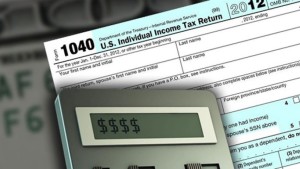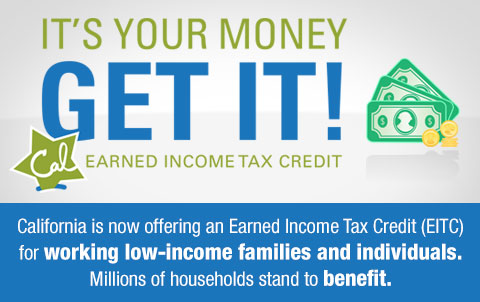Are you eligible for CalEITC? Don’t give up money that’s yours
Justin Redmond no longer has to spend hours on public transportation commuting to work and school from his home in San Bernadino County, California.
With the $600 tax credit that the 23-year-old received from the state of California last year, he was able to finally fix his car, something his $800-a-month janitorial salary didn’t allow him to do. “I had been struggling to get around,” he says.
Redmond is among hundreds of thousands of low-income residents who benefited from the California Earned Income Tax Credit (CalEITC) program that the state launched in 2015 to help families making less than $14,000 a year.
The program allowed some 385,000 people statewide who filed tax returns for 2015 to get the credit, of about 600,000 who were eligible.
“A super majority of Americans are living in a persistent state of economic anxiety,” says Joseph Sanberg, the founder and chair of the educational campaign around the new tax credit.
“Seventy-five percent of Americans cannot afford a $700 financial shock. The CalEITC is a direct way to boost the income of low-income workers and give them the economic security to fulfill their human potential,” Sanberg explains.
California is one of 25 states, including the District of Columbia, with such a program. There’s been a federal earned income tax credit since the 1970s, but now more states are instituting their own programs as well. In California, the average state payout is just over $500.
“Think of the ways an extra $500 can help a struggling family,” says State Senator Toni Atkins (D-San Diego).
Atkins had pushed for the credit during her time as the Assembly Speaker because, she says, “a refundable tax credit is proven to be an effective tool for helping lift families out of poverty.”
“But we have more work to do,” she says. “First, we must continue to spread the word about this tax credit … too many people are leaving this income on the table, simply because they don’t yet know about it. Second, when the state budget will allow it, I would like to see the program expanded so that more workers are eligible.”
Last year, Sanberg unsuccessfully tried to get the state legislature to raise California’s EITC income threshold from its current $14,000 a year to $20,800, so that full-time workers making the $10-an-hour minimum wage could be eligible.
There are two bills currently in the Assembly that would open eligibility to full-time minimum wage earners and to self-employed taxpayers, for taxable years starting in January 2017.
“CalEITC must be expanded to serve more working families,” says Sanberg. “By increasing the eligibility threshold to full-time minimum wage, and including self-employment earnings, families who struggle daily but still make too much to receive the current EITC will be able to access a life-changing boost in income.”
Advocates promoting the tax credit are making an extra effort to inform residents of economically depressed counties like San Bernardino.
Redmond found out about the program through notices sent out by his school, San Bernardino Valley College. The first-time tax filer took advantage of the free services offered by Volunteer Income-Tax Assessment (VITA), which set up a mobile site on the school campus.
“This tax season there’s a lot more awareness [of the new tax credit],” says Jason Montiel, a spokesperson for the state’s Franchise Tax Board who also volunteers as a VITA tax preparer.
He says that low-income people should not abstain from filing their tax returns just because they’re not required to (in California, people making less than $16,000 a year aren’t required to file at all).
In order to receive the tax credit, low-income residents have to be sure to file their taxes by April 18.









